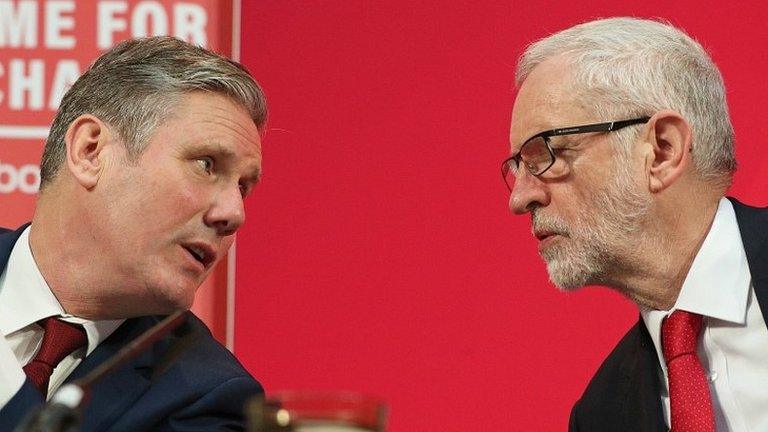Laura Kuenssberg: Starmer's relief and delight at Labour rule changes
- Published

Labour leader Sir Keir Starmer pictured with his deputy, Angela Rayner
"Labour is changing in front of our eyes," says one of Keir Starmer's allies. That, for the Labour leadership, is the point.
It's only a few days since they took the powerful unions and the left of the Labour Party by surprise in revealing their intention to sweep away rules that were the framework for the Jeremy Corbyn era.
Those were the rules that encouraged thousands upon thousands of new members into the party, who then chose Mr Corybn. Those were the rules that gave power to members to try to get rid of their MPs.
And suggesting getting rid of those rules created huge upset, provoking the ire of union leaders, who felt they'd been cut out of the loop, and anger among some on the left who felt the leadership was trying to wrestle power away from them.
One senior party figure told me: "There was a lot of swearing on both sides."
Confronted by accusations that he'd failed to do the groundwork, amid warnings that he would not be able to ram the overhaul through in a matter of days, Sir Keir dropped one of the big ideas - changing the electoral college, the party's voting system. You can read about what happened here.
By Sunday night, however, Starmer's team was delighted by what happened - after what they see as that temporary humiliation.
After discussions on the conference floor, the leadership was able to change a significant number of the rules, making it harder for members to get rid of MPs they weren't happy with, in so called "trigger ballots", giving MPs more power in selecting the party's leader, and cracking down on anti-Semitism.
They are pleased and relieved for three big reasons.
One shadow cabinet member said the changes were "the right thing to do and the right time to do it". Removing trigger ballots should, in theory, mean that Labour MPs can spend more time talking to constituents than having to worry that every move might lead to their local party trying to oust them.
And for Starmer's team it cuts down on the risk of "entryists" to the party, who could join for a few pounds to install their favoured candidate, even if they have no long-term commitment to the Labour Party.
Inevitably, it's outraged many of former leader Jeremy Corbyn's backers, and those who believe that activists should have that power.
It's worth noting, too, that the plans passed because of the backing of the unions and MPs, not existing members. But the hope in the leader's office is of a party that becomes more manageable and more disciplined.
'Three days of pain'
Similarly for Starmer's team, cracking down on anti-Semitism was the first promise he made on becoming leader, and a promise that he had to keep.
Beyond the technical impact of the changes, party top brass feel too that their decision in pushing for the changes, and to do so quickly, is a vindication of Starmer's judgement.
He was warned against picking the fight, was embarrassed when he ditched some of his plans, but pushed on with a watered-down programme and won.
One of those behind the strategy told me: "If we had to take three days of pain so we could spend the next 18 months facing outwards and talking to the public, it was worth it."
Keir Starmer's critics often portray him as too safe, too cautious. This time he's secured changes "in six days that could have turned into six months of arguments".
Lastly, a highly visible vote, a highly significant (in Brighton at least!) change also gives evidence Starmer desperately wants to show the public that Labour is changing.
Left's sway fading
Inside the party, Jeremy Corbyn was wildly popular in some sections, and excited a new generation of activists who hadn't been previously reached. But his leadership was toxic to many, and the party crashed to its worst defeat in decades with him in charge.
Keir Starmer - who don't forget was part of Mr Corbyn's top team throughout - has long believed that he has to show to the country, not just that it has a new boss, but that it is turning into a different party altogether.
Sir Keir was pictured having a shandy, celebrating the Arsenal result, and perhaps tonight's results too.

Keir Starmer watching his team, Arsenal, beat North London rivals Tottenham 3-1 on Sunday
But the win for the leadership does not sweep away all of their problems. Far from it. There is intense pressure on Sir Keir to say more about what he would want to do in government, to put forward more convincing policies, and to communicate them better.
There are people in the party like Greater Manchester Mayor Andy Burnham willing to say that out loud, too, as he did speaking to us on Sunday in pretty bold terms.
And there are also plenty of activists, and some MPs on the left, who are not on board with these changes, and may never be.
The left's sway is clearly fading here, but it hasn't disappeared. One senior party figure told me "they are still alive and kicking", and it's not clear how hard they will be willing to kick.
But the internal wrangling came out in Sir Keir's favour on Sunday. He hopes it will clear this vital week for other conversations.
Related topics
- Published26 September 2021

- Published25 September 2021

- Published25 September 2021

